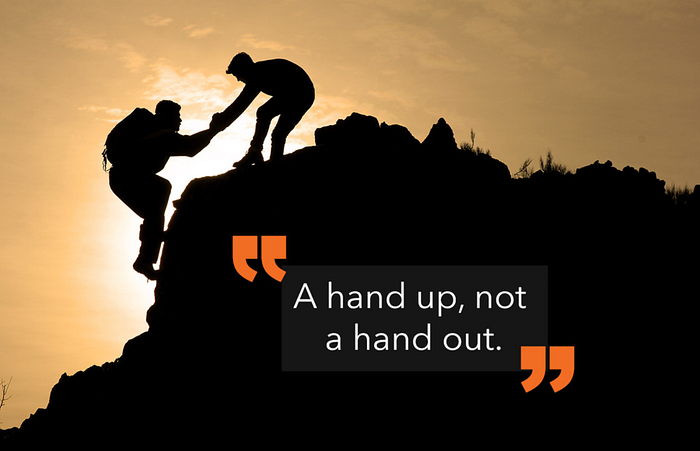Financial Education: Personal Budgeting 101- Back to Basics
March 8, 2022
Budget…it is such a horrible word sometimes and, to many, this is as tough as going for a dentist appointment. Maybe worse!
These days, we live in a world where credit is abundantly available and it seems that everywhere we look, you can ‘buy now and pay later’. Don’t get us wrong, we love credit and credit cards. In fact, we can have a whole course on WHY credit and credit cards are awesome WHEN YOU KNOW how to use them to your advantage. So this is not one of those “CUT OFF YOUR CREDIT CARD” or “ONLY USE DEBIT or CASH” conversations. Rather, this is to get you to simply honour your long-term financial goals, and build the proper tracking habits to help you get there.
One of my friends said it once — “I try to make my budget every month and try to stick to it. But the reality is — I never really stick to it. I go back to review it once in a blue moon and then I realized that I’m just really tracking my expenses.” Regardless of where you are in your financial journey, I think it’s a really good starting point as “tracking” — aka. developing some sort of awareness of what’s happening — is definitely the first step. And the second step is the discipline to execute on your budget plan. Well, because ‘talk is cheap’!
Many of us here at Trust Your Talent have different ways to ‘budget’ but I want to share my personal experience and how I did (and still do) it. I hope that you enjoy this little read as much as I enjoy sharing it with you.
First thing first, we are going to focus on personal budgeting today. Many of the same principles apply when you’re doing budgeting for business and investment properties. That will be covered at a later date.
Let’s take a look at the 2 basic elements of ‘budgeting’ — you make your money (revenue or income) and you spend your money (expense). The budgeting part often refers to the ‘spending/expense’ portion of this equation. However, if you’re in sales, work more than one job or, for whatever reason, your income is not steady or predictable, this definitely applies to both sides of the equation. For now, we’re just going to focus on the expense side.
Before we start, like everything else, you need to set a goal for why you even want to (or need to) budget in the first place. To take the guess work out, and to avoid making you go “oh gosh, here we go about goal setting again”, it’s actually quite simple here — is your goal to have a surplus, to break even or to minimize loss?
This may shock you a bit, but when I first started budgeting, my goal was simply to break even — being very careful with the allocation of every penny I had. Why? In 1999, when I first moved to Canada as an international student, I was not legally allowed to work in the country at the time. As a result, I relied on my parents to send me money for survival and tuition. And no, I’m not one of those “born with a silver spoon in my mouth” Asians. I came from a very financially humble background. That’s the reason why I had to budget (and eventually want to find better ways to make money even when I sleep). I couldn’t afford to spend more than what I had or I’d be in a great deal of bad debt. Before the start of every semester, I was responsible for sending my parents a figure — and that figure would represent the dollar amount that I would need to cover my tuition, books and all my living expenses. I would give them a number ahead of time so that they had enough time to get the money ready and, ideally, aim for a good exchange rate.
A quick side note on this is that I didn’t realize how valuable this experience was for me until I started running my own business. I learned to forecast expenses, exercise my discipline to stick to the budget I had, and be creative with what I got. More to come on that front later when we take this to the next level.
A detailed breakdown of my expenses at the time would include items like: tuition, books, rent, utility bills, internet, cellphone, car insurance, gas, grocery, health, dining out, entertainment, personal care, and a small contingency fund.
Tuition and text books were easy as those numbers were given to me and I had little to no room to negotiate. Of course, I would try to get 2nd hand books by lining up for hours at the university book store a week before school started. (Keep in mind that this was the year of Y2K so all the modern resources we have today were not around yet. Blackberry was not mainstream and the iPhone was not even invented yet for another 8 years!). The less I spent on the books, the more leftover I would have from that to apply to something else like maybe going out for a movie night with friends later on. Ok, I kid, not a huge movie goer myself, we would pay $7 dollar for 5 hours of karaoke (1 soda included — great deal!).
When it comes to living expenses, my rent was also fixed from the lease I signed. I would normally aim for a 2-bedroom place and bring in a roommate as splitting a 2-bedroom place often times worked out to be more cost effective than paying for a studio unit by myself, especially when you add in all the utilities. Of course, you could always find a 5-bedroom house and share with more roommates to cut down expenses — the same concept would still apply.
After that, it’s time to maintain myself — first thing first, this includes keeping myself fed (and hopefully relatively well-nutritioned). I learned how to coupon and look for deals and plan my grocery shopping accordingly. My friends and I even scouted out a few places around town with ‘value meals’. Also, for our favourite places, we practically memorized their daily promotions and happy hour menus in order for us to enjoy dining out more frequently than if we were to go during regular prices. By the way, this is why I still can’t eat har-gow (you know, those steamed shrimp dumplings) at a dim sum restaurant because of the $1.99 special. I had SOOOO much of it back in the days. Too much.
Now that the basis are basically covered as a professional student, the rest sort of became variable costs. Expenses like buying dish soaps, shampoo, face wash, garbage bags, getting a hair cut, buying new clothes, going to concerts, to volunteering-related expenses like attending seminars and conferences — these seemed a lot trickier to budget initially until you sort of get into the groove of things. Some would argue that some of the things on this list are necessities and some would have a totally different opinion. The easiest way to get some initial idea of how much you’re spending on these things would be to just look back at the last 12 months (if you have that data available).
The bottom line is — figure out why it is that you want to do a budget. I shared earlier that I wanted to break even as a student. The real reason is because I know my expenses were a huge weight on my parents’ shoulders and I did not want to ask for more than I really needed. I budgeted reasonably and the rest is up to me when the money comes into my bank account. Through that experience, I really learned to play with what I had — sort of like making an elaborate Halloween costume on a small budget, but somehow, it always works out! I learned to be creative and ‘allocate’ my resources on things and experiences that would truly bring me meaning and joy. For example, I’d shop for discounted grocery items either through combing through the flyers ahead of time or capitalize on soon-to-expire items when I can as long as I knew I was going to cook them that night. (Again, this was the pre-smartphone age. No help from any apps whatsoever. It was done the old-fashion way!). This allowed me to buy CDs because I love music as it’s my soul food. I would say NO to dining out a couple of times to get a new t-shirt. The biggest example I have is this. Truthfully, I’m not overly proud of how this sounds, so please focus on the lesson and the merit of the story here — I ate instant noodles and bought cheap groceries for a while, didn’t shop for anything I didn’t ‘need’ so that I could trade my car in for a nicer car with a larger monthly payment. Again, there was no added effect to my parents, but I got everything I wanted still. The side lesson there, which I see in all mankind these days is: if you want something bad enough, you’ll do whatever it takes to make it happen. If not, you’ll find excuses to avoid it.
The skills and the lessons I got from all those years carried over to where I am now as a person, as an investor and as a business owner. When I decided to be financially free, it was cutting expenses as quickly as I could while building passive income at the same time. By lowering my expenses diligently and quickly, I was able to hit my goal a lot faster as well.
It’s the habit, the ability to be creative, and more than anything else, the satisfaction to know that I can exercise my own discipline and financial knowledge to create the life that I want and have today that I’m grateful for, and want to share with you all.
Today, on my personal budget sheet, it’s still very straight forward — expenses for mortgage payments, utilities, car, internet and cable, pet expenses (yes, I still have a fur a baby), medication, dining out and entertainment and personal expenses like supplements, haircuts and the occasional shopping. Not much has changed on that front, but the business side of things are bananas!
Now, it’s your turn. Use the questions below as prompts to create a personal budget for success. Hold yourself accountable. You are a micro economy to yourself. Master this first so you can take it to the next level!
Questions –
- Why do you want to create a budget? Is it simply to create a better financial habit?
- What’s your goal to create a budget — to have surplus, breakeven, or know how much in the hole you currently are?
- Use the sample worksheet (my Mom created this for me in 1999, and I just modify the expense items these days), start to fill out your income sources and BUDGET expenses.

5. Examine the numbers you’ve put in. Are you happy with these numbers?
6. Now, start to put in your actual expenses — if you can, go back to the last 2 months and record them. Measure them against your budget.
Examine the numbers again — this time, pay attention to the DIFFERENCES. Anything jumps out?
If yes, does this number contribute to your larger financial goal?
If no, what differences would you like to see?
To be continued…























